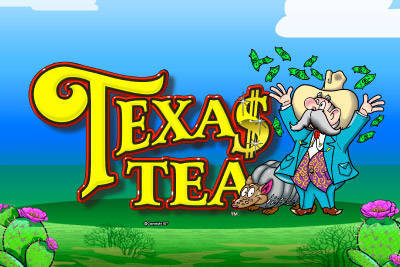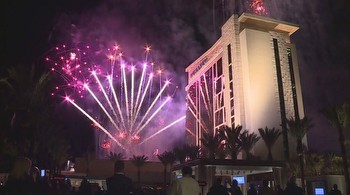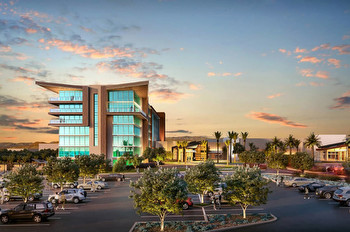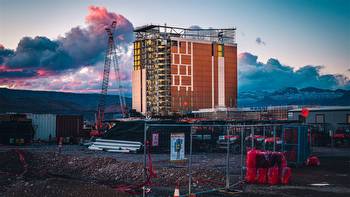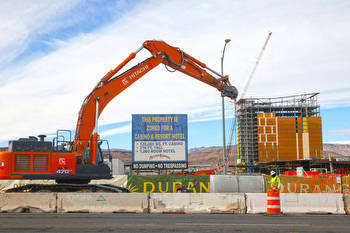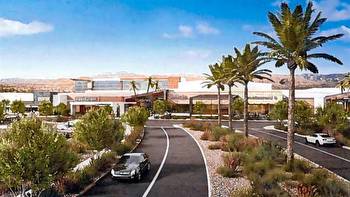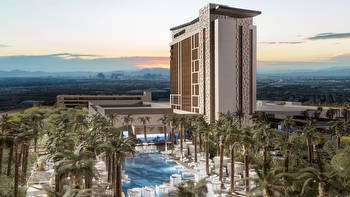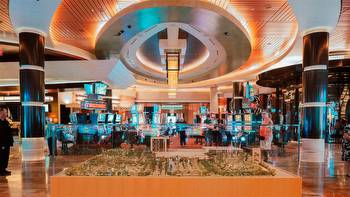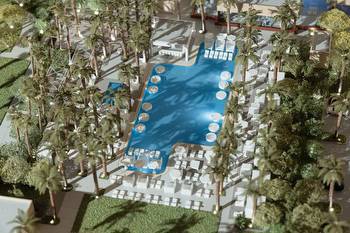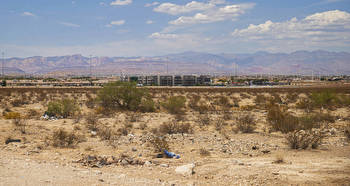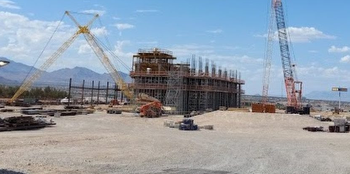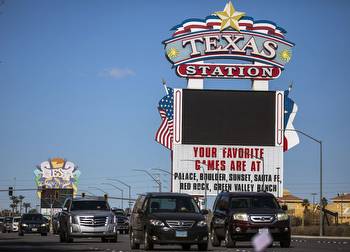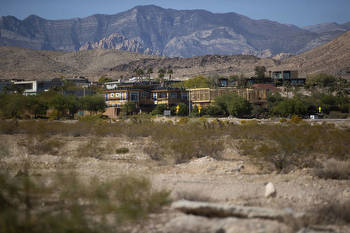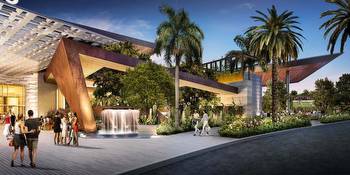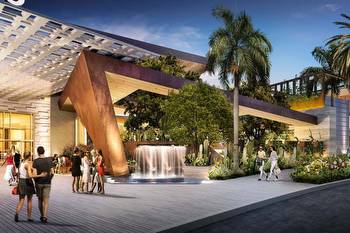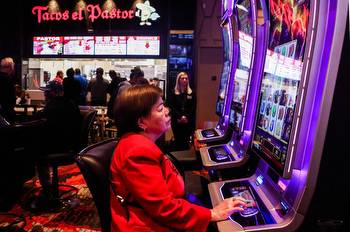Station Casinos’ Durango opens Tuesday
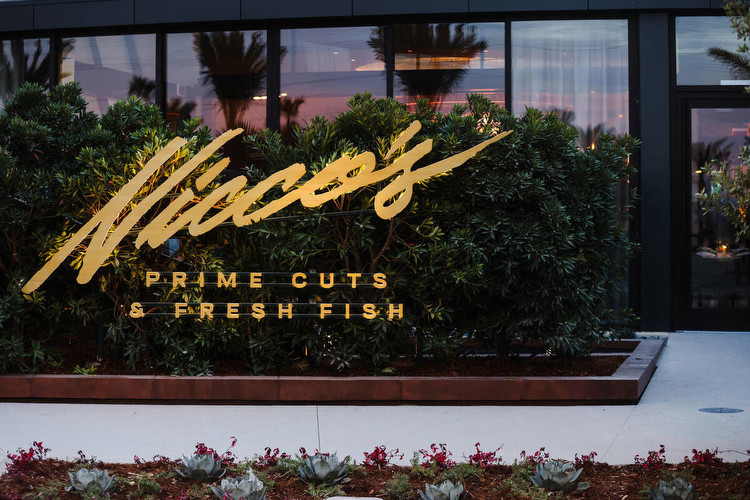
Durango General Manager David Horn knows exactly which spot he wants to be in before the resort-casino’s doors open for the first time.
He envisions himself standing at the center of the casino in the Oasis Bar, elevated over the pit and slot areas, as the expected thousands of visitors take in Station Casinos’ newest property for the first time.
“My idea was to go there at two minutes till, let the doors open and just watch people fill into the casino in dramatic fashion,” Horn, a 27-year employee of the locals casino company, said. “That’s the bird’s eye view I want to have.”
On Tuesday, Station’s parent company Red Rock Resorts will open its first ground-up resort-casino project in more than a decade. The roughly 200-room, 83,000-square-foot-casino property is a turning point for the 47-year-old brand as it embarks on a plan to build out its presence in growing areas of the valley through the rest of the decade.
Durango, a luxury property in a rapidly growing area of the valley, is the first step.
What to expect
The $780 million project on South Durango Drive near the 215 Beltway will have more than 2,300 slot machines, including some property-exclusive games, and more than 60 table games in the casino. For high rollers, there will be two high-limit rooms: one for slots and one for table games, and three private salons. Durango also has 20,000 square feet of meeting space.
The property is also focusing heavily on the food and beverage experience: It planned the 25,000-square-foot, 11-stall “Eat Your Heart Out” food hall, four standalone restaurants and two bars for the property.
Unlike other Station properties, it doesn’t have a bowling alley, movie theater or spa — though those amenities could come in future development phases if greenlit.
Hotel accommodations were designed by Dallas-based firm Looney and Associates with neutral, warm tones and texture that highlights the desert’s natural beauty. Nearly 30 suites have luxury amenities such as in-mirror televisions and tablets controlling volume and lights and an exterior notification light for housekeeping. Further playing into its natural themes, some north-facing rooms have panoramic views of the valley.
Durango is taking a slightly different approach to its Tuesday opening. Many recent resort-casino openings have welcomed players to the casino floor late at night, but Durango will open at 10 a.m. Guests can line up to be first inside as early as 9 a.m.
In contrast, when Red Rock opened in April 2006, the Las Vegas Review-Journal reported the casino’s opening night was meant to tap into Vegas’ penchant for grandiose debuts. It had a secret VIP performance from Sting and complimentary glasses of Dom Perignon champagne and Ferrari-Carano wine for invited guests before the resort opened to the public just before midnight.
Don’t expect secret performances at Durango, Horn said. The team chose a morning opening time and a 9 p.m. fireworks show as a way to encourage visitation throughout the day.
“For us, I think it’s just more about the building and the product that we’ve created and the people that have brought this building to the opening state, and maybe less about the formalities,” Horn said.
Long-awaited project
In some ways, Durango was decades in the making. Station Casinos purchased 71 acres from developer Jim Rhodes in 2000. The land had been zoned for a neighborhood casino three years earlier. In a common approach for the company, it had no imminent plans to develop a casino there but instead waited for the area to grow around it.
The company first proposed Durango Station in 2004 and faced some hyperlocal opposition because the initial proposition mentioned a gaming space up to 215,000 square feet — the land entitlement’s maximum amount. By mid-2008, a smaller-scale project was in the works, and company officials had tentatively eyed a 2011 opening, depending on economic conditions. But months later, the investment firm Lehman Brothers collapsed, triggering the Great Recession and causing the company to pull away from the project.
“Now is not the time for new development,” a spokeswoman said at the time.
The project’s revival began again more than a decade later. Parent company Red Rock Resorts’ 2019 annual report noted the Durango plot had “excellent visibility and access from Interstate 215” and noted it has no major casino competition within five miles.
The new Durango project started to publicly take shape in May 2021. Red Rock executives announced that they would sell the Palms — the off-Strip property it owned since 2016 and invested $690 million in improvements — to the San Manuel Band of Mission Indians for $650 million and the sale proceeds would “accelerate the development” of Durango.
Decade of growth planned
Durango’s opening is part of Red Rock’s larger goal to dominate the locals casino market. Executives have said they hope to double the company’s Nevada footprint in the next decade.
Executives previously said the bullishness comes from the number of people moving to the region and the growth in new communities along the valley’s periphery. The company has a long history of snapping up and holding onto large swaths of gaming-zoned land until the timing is right.
To fund the projects, Red Rock is looking at the land under shuttered casinos. Texas Station, Fiesta Rancho and Fiesta Henderson all closed during the pandemic. The two North Las Vegas sites have since been demolished and cleared for a mixed-use project, while Fiesta Henderson was sold to the city to build a sports facility.
It also permanently closed a small casino, Wild Wild West on Tropicana Avenue near Interstate 15, and is looking to sell that land, according to a commercial real estate listing, after a plan to build a Major League Baseball stadium fell through this year.
Company officials have not specified where their next project will take place; instead they focus on getting all of the entitlements ready so they have optionality on the next project. But they have publicly spoken highly of 47 acres in the northwest valley’s Skye Canyon community, 45 acres in Henderson’s Inspirada Community and 126 acres on Las Vegas Boulevard South and Cactus Avenue, near I-15.
Also identified for possible development are holdings in Summerlin, 58 acres at Flamingo Road and the 215 Beltway; 96 acres at the Wild Wild West site, though some or all could be sold; and about 66 acres at Losee Road in North Las Vegas.
“As we look at Las Vegas, we’re very confident,” President Scott Kreeger told the Nevada Gaming Commission in September. “There’s no one more bullish on Las Vegas growth than we are. We intend in the future as a company to continue to invest in Nevada and its citizens. We plan to grow the company over the next 10 years. We have seven development sites inclusive of Durango that we are on a course to double the size of the company over the next 10 years.”
McKenna Ross is a corps member with Report for America, a national service program that places journalists into local newsrooms. Contact her at mross@reviewjournal.com. Follow @mckenna_ross_ on X.







